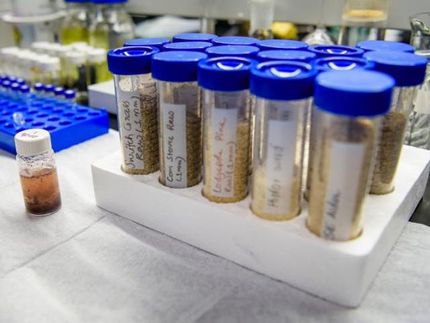Biofuels from the brewery?
Separating beer waste into proteins for foods, and fiber for biofuels
Home brewing enthusiasts and major manufacturers alike experience the same result of the beer-making process: mounds of leftover grain. Once all the flavor has been extracted from barley and other grains, what's left is a protein- and fiber-rich powder that is typically used in cattle feed or put in landfills. Scientists report a new way to extract the protein and fiber from brewer's spent grain and use it to create new types of protein sources, biofuels and more.

Symbolic image
pixabay.com
The researchers present their results at the spring meeting of the American Chemical Society (ACS). ACS Spring 2021 is being held online April 5-30. Live sessions will be hosted April 5-16, and on-demand and networking content will continue through April 30. The meeting features nearly 9,000 presentations on a wide range of science topics.
"There is a critical need in the brewing industry to reduce waste," says Haibo Huang, Ph.D., the project's principal investigator. His team partnered with local breweries to find a way to transform leftover grain into value-added products.
"Spent grain has a very high percentage of protein compared to other agricultural waste, so our goal was to find a novel way to extract and use it," says Yanhong He, a graduate student who is presenting the work at the meeting. Both Huang and He are at Virginia Polytechnic and State University (Virginia Tech).
Craft brewing has become more popular than ever in the U.S. This increased demand has led to an increase in production, generating a major uptick in waste material from breweries, 85% of which is spent grain. This byproduct comprises up to 30% protein and up to 70% fiber, and while cows and other animals may be able to digest spent grain, it is difficult for humans to digest it because of its high fiber content.
In order to transform this waste into something more functional, Huang and He developed a novel wet milling fractionation process to separate the protein from the fiber. Compared to other techniques, the new process is more efficient because the researchers do not have to dry the grain first. They tested three commercially available enzymes -- alcalase, neutrase and pepsin -- in this process and found that alcalase treatment provided the best separation without losing large amounts of either component. After a sieving step, the result was a protein concentrate and a fiber-rich product.
Up to 83% of the protein in the spent grain was recaptured in the protein concentrate. Initially the researchers proposed using the extracted protein as a cheaper, more sustainable replacement for fishmeal to feed farmed shrimp. But more recently, Huang and He have started to explore using the protein as an ingredient in food products, catering to the consumer demand for alternate protein sources.
However, that still left the remaining fiber-rich product without a specific use. Last year, Huang's postdoctoral researcher Joshua O'Hair, Ph.D., reported finding a new species of Bacillus lichenformis in a spring at Yellowstone National Park. In the paper, they noted that the bacteria could convert various sugars to 2,3-butanediol, a compound that is used to make many products, such as synthetic rubber, plasticizers and 2-butanol, a fuel. So, He pretreated the extracted fiber with sulfuric acid, then broke it down into sugars from cellulose and hemicellulose. She then fed the sugars to the microbe, producing 2,3-butanediol.
Next, the team plans to work on scaling up the process of separating the protein and fiber components in order to keep up with the volume of spent grain generated at breweries. They are also working with colleagues to determine the economic feasibility of the separation process, as the enzymes currently used to separate the protein and fiber components are expensive. Huang and He hope to find suitable enzymes and green chemicals to make this process even more sustainable, scalable and affordable.
Topics
Organizations
Other news from the department science
These products might interest you

BRC - Berghof Reactor Controller by Berghof
BRC - complete package for data acquisition, storage and control of all process parameters
Touch controllers are easy to use and provide quick access to all important functions

Berghof Reaktortechnologie - Hoch- und Niederdruckreaktoren, Druckbehälter und metallfreie Reaktoren by Berghof
Safe high- and low-pressure systems for aggressive media
Corrosion-resistant reactors with PTFE lining - individually configurable

Get the chemical industry in your inbox
By submitting this form you agree that LUMITOS AG will send you the newsletter(s) selected above by email. Your data will not be passed on to third parties. Your data will be stored and processed in accordance with our data protection regulations. LUMITOS may contact you by email for the purpose of advertising or market and opinion surveys. You can revoke your consent at any time without giving reasons to LUMITOS AG, Ernst-Augustin-Str. 2, 12489 Berlin, Germany or by e-mail at revoke@lumitos.com with effect for the future. In addition, each email contains a link to unsubscribe from the corresponding newsletter.




























































